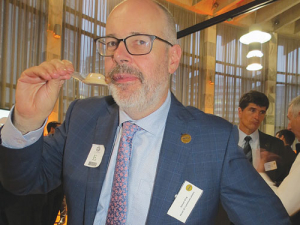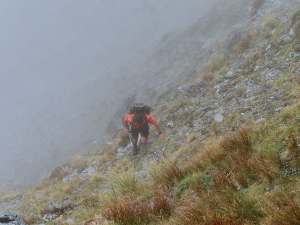A report by the ANZ bank says New Zealand is failing to take full advantage of promoting our quality food to tourists to this country.
The just-released report is intended to raise the profile of NZ’s food tourism opportunities. It says although a number of individuals are combining food tourism with an ‘agricultural experience’, much more can be done.
For example, it says that although many Chinese tourists visit NZ farms, these visits do not translate into high spending on food and beverages during their stay. Yet China is among NZ’s biggest markets and a survey of Chinese tourists shows they want ‘eclectic and authentic’ experiences, hence there is great opportunity to link food tourism to their farm visits.
The report also shows that internationally NZ is well down the pecking order in attracting tourists on the strength of its food and beverage offerings. Italy, France and Spain top of the list, while NZ languishes near the bottom. In recent years, talk about defining a ‘NZ cuisine’ has not translated into much progress.
Statistics in the report show that NZ rates highly in the ‘neutral’ category of food and beverage tourism, which simply suggests that the messages on tourism and agriculture/food must go hand-in-hand. The report states that by making food and beverage an integral part of tourism, the goal would be to increase the amount of money tourists spend here.
The report also notes a big opportunity for Maori to be involved in this, given that most tourists seek a ‘Maori cultural experience’. And it says there are opportunities in the regions to expand food and beverage tourism and an agri experience. From a farmer’s perspective, and the economy in general, a big gain can be made if tourists leave NZ having enjoyed a good food and beverage experience.
ANZ’s John Bennett says the bank’s research reveals that at least 60% of international travellers will, when they return home, seek out products from the country they have visited. But NZ’s food and beverage experience ranks second-lowest in the world for tourists and this needs to change.
Bennett hopes the report will help challenge business practices and stimulate thought on more collaboration between the primary and tourism sectors.
Food tourism focus
A lecturer in management at Massey University, Dr Kate Bone, says the idea of food tourism should be further explored.
Bone, whose subjects include tourism, says New Zealand needs to build on its clean, green image and emphasise sustainability and ethical food production.
She says the report notes that 52% of the visitors who identified as ‘foodie’ tourists were of the Gen X/millennials age group and were more likely to take food and wine back to their home country.
“We know that Gen X and millennials are more likely to make conscious, ethical consumption choices by considering animal rights, environmental, sustainability and animal welfare practices. As these generations age they will continue to be key consumers within the tourism sector, so if NZ goes down this route it is future-proofing the sector which is excellent,” she says.
Bone says NZ has to set itself apart from other countries and develop authentic and sustainable foods that can’t be matched by others. But she says NZ should be careful about the foods it offers and not compromise its standards to pander to all the desires of its tourists.
“NZ is a beautiful country with vast landscapes and we have opportunities for free range farming practices and the production of organic wine and cheese. So wouldn’t it be great if we were known for those things,” she says.










